外研版八年级英语上册Module3 Unit 1 教学设计
外研版八年级英语上册Module3 Unit1 说课稿

外研版八年级英语上册Module3 Unit1 说课稿Module 3 SportsUnit1 Nothing is more enjoyable than playing tennis.Good morning, I am Cheng Shuhui from Hefei Xing Zhi School. It’s my great honor to be here sharing my teaching ideas with all of you. The content of my lesson is Module 3 sports Unit1 Nothing is more enjoyable than playing tennis taken from New Standard English textbook for eighth-graders by Foreign Language Teaching and Research Press. The following five parts will be covered in my presentation: the guiding theory, general introduction, analysis of teaching procedures, homework & blackboard design, and features of my design.Part 1 Guiding TheoryThe lesson is designed under the guidance of Core Competence of English Subject, the View of English Learning Activities, and Bloom's Taxonomy of Learning.Part 2 General Introduction(there are basically 6 aspects)I. Analysis of Teaching Material & Target StudentsFirst of all, I analyze the unit from three dimensions: What, How and Why.What:Theme: Humans & societyContent: The type of this lesson is listening and speaking. The topic of the dialog is about sports.How:Structure: The dialog is arranged in the logical order. The passage consists of several turns of talking on sports and other things they like and the reason why they like them.The target language: The Comparative Degree.Why:Intention & The thematic meaning: To arouse students’ awareness of the importance of keeping doing sports.Next, I am going to talk about my students.The target students are English learners in Grade eight. They are active, imaginative and more cognitive. From the perspectives of their background knowledge, present difficulty and breakthrough methods, I adopt SWOT model to analyze the learners.II. Teaching ObjectivesBased on analysis of the teaching material and target students, the objectives can be designed as follows:At the end of the class, students will be able to:a) Identify and cognize the topic-related vocabulary;b) Summarize and integrate the information about sports and perceive the Comparative Degree;c) Notice the rule of the Comparative Degree and talk about one’s favorite sports and give reasons using the Comparative Degree in the practical scene.d) Use proper strategies like prediction or note-taking while doing listening activities.e) Create a new dialog between a reporter and students on the sports they like and the reason why they like it.f) Debate and express their own opinions on different sports they like.g) Form correct values knowing that sports is the source of all life. The importance of doing sports can be highlighted within all kinds of activities.(the four elements of core competence permeate mutually in the objectives)III . Key points and difficult pointsAccording to the objectives above, the key points are:a) to define and cognize the key vocabulary;b) to comprehend the dialog by strategies;The difficult points are:a) to talk about one’s favorite sports and give reasons using the Comparative Degree in the practical scene.b) to understand the structure and the way of developing a conversation and then create an imitative dialogIV. Teaching methodsTo achieve the objectives, stress the important points and break through the difficult points, I use PWP Approach, Activity-based Approach, and Communicative Approach..V.Teaching aidsI use the projector, the blackboard and the learning sheets.VI. EvaluationI adopt Teacher’s evaluation, self- evaluation and peer evaluation to inspire most students and evaluate students fairly from all-around perspectives.Part 3 Teaching procedures:Now I would like to introduce my teaching procedures in detail which consists of mainly three aspects: pre-listening, while-listening and post-listening activities.1. Pre-listening activitiesStep 1 Warming-upI will show students a video clip which is taken from the recording of World Cup Final 2018.(Present a short video and pose a question: what is it about? )Purpose of my design: students are familiar with football and have a desire to express, which can arouse students’ interest, lead in the topic, and transfer towards the textbook.Step 2 BrainstormingEncourage them to list out other sports they know.Purpose of my design: To activate students’ background knowledge and build a sense of achievement at the very beginning in order to remove word barriers, activate information gap and stimulate students’ activeness in listening.2. While-listening ActivitiesAnd next let’s move on to the while-listening part, which includes three steps.Step 1 Listen for preparationStudents are guided to do a matching and gap filling activity after listening to a conversation about different kinds of sports. Some listening skills will be introduced before doing the activity.Purpose of my design: in this way, students can develop the predictive skill and move the word barrier for conversation which contains several turns of talking about sports. It will somehow low down students’ anxiety of learning.Step2 Listen for specific informationAfter getting ready, it’s time to get more details.Firstly, ask students to get detailed information while listening to the conversation for the first time to answer some wh-questions about sports in it.Purpose of my design: enable students to have an overview of the conversation and got familiar with the framework of this dialog.Then ask students to listen to the conversation for the second time to check true statements.Purpose of my design: enable students to have a deep understand of spoken language. Meanwhile, some listeningstrategies will be introduced to help them get a better understanding of their opinions towards different sports.After that, students will be guided to focus on the key information of comparison of different sports. Highlightthe Comparative Degree in different comparisons. The framework of the topic will be extracted as well.Purpose of my design: enable students to have anoverview of the conversation and get familiar with the framework of this dialog.Steps 3 Listen for languageAlso, some questions will be presented to help students analyze the language from the perspective of sociallinguistic level. Encourage them to find out how dospeakers express themselves well with different utterances.Purpose of my design: enable students to get more information about language focus in the conversation.Then, they will read to summarize different comparisons with different forms of comparative adjectives, especially, those with mutisyllable adjectives.Purpose of my design: the most difficult language point will be visualized in a deductive way. The usage of theComparative Degree will be concluded with sentences on the screen in order to prepare for the language output.3. Post-listening ActivitiesStep1 Role-play the dialog.Now that student will role-play the dialog.Step2 DebatingAfter series of interpretations, students now have already known how to express themselves with the Comparative Degree on sports they like. They will work in groups to defend themselves on which sports is better for students.Purpose of my design: on the one hand, students are expected to apply what they learned immediately into practice and expand thinking (their critical thinking and dialectical thinking are cultivated here), on the other hand, the discussion can lower the difficulty for writing and get students prepared efficiently.Step3 WritingCreate a real situation: In the new term we’re going to have new sports clubs (such as the football club, the baseball club, the volleyball clu b…).Which sport club do you want to join? Give your reasons!Purpose of my design: encourage students to output the target language in a real scenario. The topic can be learned or created. They can discuss and cooperate while writing.Step4 Discussion and summaryFinally, ask students about the motto of the Olympic Games. Lead them to be aware of the importance of sports.Step 5 HomeworkOptional: Make a poster about sports you like.Compulsory: Work in groups to make the interview more logical.Step 6 Blackboard designPurpose of my design: 1.Show the content and topic of the discourse. 2. Highlight the key information of the discourse.Part4 Features of DesignFor the last part, let’s come to the features of design.1.Learner-centered teachingStudents are indicated to finish diverse tasks individually or cooperatively. Students are the real masters of the class while the teacher myself is the director, organizer, evaluator and promoter. I just facilitate students to achieve the objectives step by step.2.Interpret the text from multiple perspectivesI focus on not only language, information and function but also the structure, meaning and logic in the process.In my instructional design, all the teaching steps are served to one or several certain objectives which point to the students’ key competences directly. All the tasks and activities are well selected in order to encourage students to have an interactive communication with the discourse.3.Mind participating(thinking quality enhancement)While we are listening, parts of our body participate actively, especially, our mind. All tasks I set are for different layers of thinking qualities. From the remembering of facts to the understanding of sentences, from analysis of structure to a creating outcome, students are engaged into different mind-developing tasks.That’s all for my presentation of teaching. Thank you for listening.。
外研版英语八年级上册Module 3第一课时教案与反思
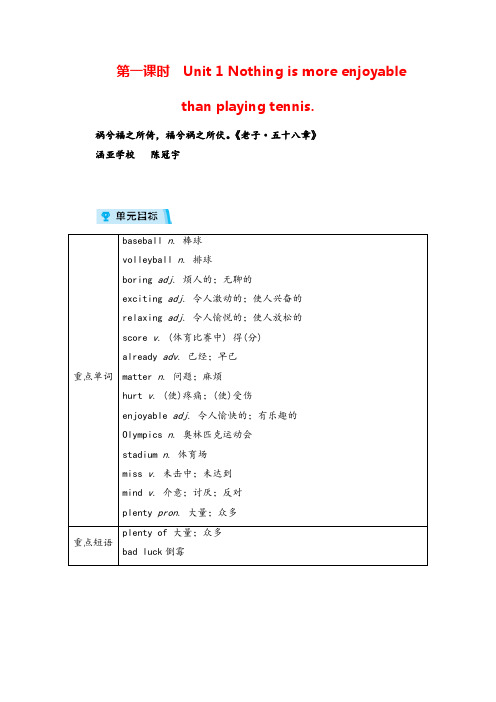
第一课时Unit 1 Nothing is more enjoyablethan playing tennis.祸兮福之所倚,福兮祸之所伏。
《老子·五十八章》涵亚学校陈冠宇重点单词baseball n. 棒球volleyball n. 排球boring adj. 烦人的;无聊的exciting adj. 令人激动的;使人兴奋的relaxing adj. 令人愉悦的;使人放松的score v. (体育比赛中) 得(分) already adv. 已经;早已matter n. 问题;麻烦hurt v. (使)疼痛;(使)受伤enjoyable adj. 令人愉快的;有乐趣的Olympics n. 奥林匹克运动会stadium n. 体育场miss v. 未击中;未达到mind v. 介意;讨厌;反对plenty pron. 大量;众多重点短语plenty of 大量;众多bad luck倒霉重点句子1.So this week's match is already more exciting. 所以这周的比赛已经精彩多了。
2.What's the matter with you, Tony?你怎么啦,托尼?3.Yes, watching is not dangerous and it's more relaxing too!是的,看比赛不危险,也更令人放松!4.Nothing is more enjoyable than playing tennis. 没有什么事比打网球更令人愉快的了。
5.Yes, but that's because it was cheaper than buying tickets for all the games. 是的,但那是因为看电视比买所有比赛的票要便宜得多。
教学难点1.让学生掌握多音节和部分双音节的形容词变比较级和副词变比较级的规则。
八年级教案教学设计说教材外研版英语八年级上册Module1八上+M1M2M3
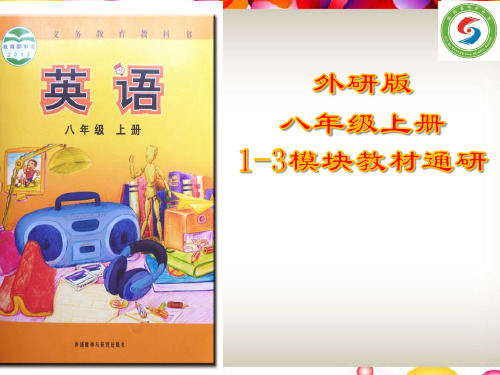
4. Listen and fill in the blanks
Here are some good ways to learn English. We should speak English ___ ___ ____ __ in class. And don’t forget to ___ ____ the correct answers next to the mistakes. It’s a good idea to ____ and ____ new words aloud every day. When we are listening, we don’t need to understand every words. We just need to listen for ______ and _____. Writing is also important. We can try to find some English __________.
Unit 1 评价任务
• 1.反复听对话,回答问题,了解英语学习的 有关建议。
• 2. 小组合作,针对英语学习中出现的问题, 提出建议。
• 3.听课文,用文中出现的词汇完成填空。 • 4.跟读并复述对话中表示提建议的句型。
Unit 1 对话处理
• 1. Listen to the radio and answer the question. • What’s the dialogue about? • 设计意图:让学生了解文本的主旨大意,理清
教材通 研结构
教材分析 学情分析 课标要求 语法结构点击 听说课 读写课
重点词句梳理 学习目标 评价任务
对话(课文)处理 练习
Module 1
外研版 英语 八年级上册 教案 :Module 3 Unit 1
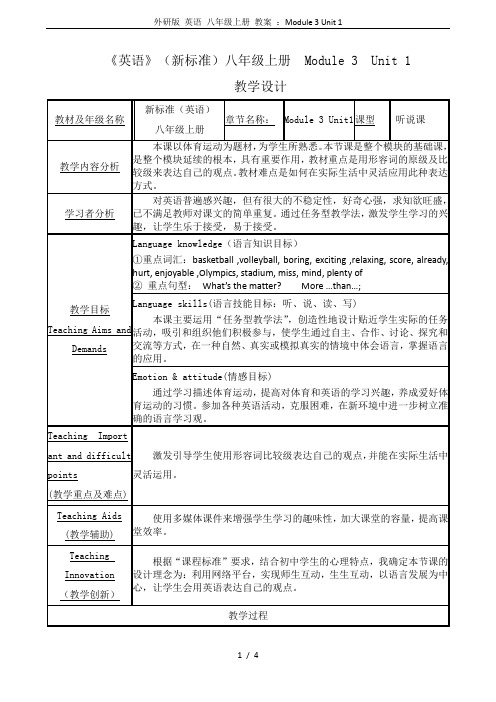
Step 3: While-task
2. Revise and learn the names of some sports.
(1) Guessing: What kind of sports is it?
(2) Look at the signs and write down the sports.
3. Learn to describe these Olympic sports using the adjectives and their opposites.
Daming:No, it isn’t. I think cycling is _____ tiring _____ running. And do you like skiing?
Betty:Yes, I do .But it’s _____ dangerous _____ running and cycling.
boring dangerous difficult easy exciting
expensive popular relaxing safe
more… than…
Teaching Aids
(教学辅助)
使用多媒体课件来增强学生学习的趣味性,加大课堂的容量,提高课堂效率。
Teaching Innovation
(教学创新)
根据“课程标准”要求,结合初中学生的心理特点,我确定本节课的设计理念为:利用网络平台,实现师生互动,生生互动,以语言发展为中心,让学生会用英语表达自己的观点。
外研版八年级英语上册Module 3 unit1 Nothing is
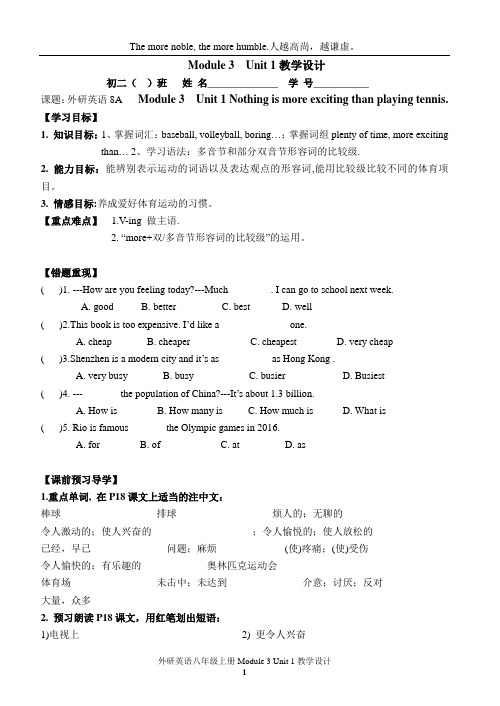
Module 3 Unit 1教学设计初二()班姓名______________ 学号___________课题:外研英语8A Module 3 Unit 1 Nothing is more exciting than playing tennis.【学习目标】1. 知识目标:1、掌握词汇:baseball, volleyball, boring…;掌握词组plenty of time, more excitingthan… 2、学习语法:多音节和部分双音节形容词的比较级.2. 能力目标:能辨别表示运动的词语以及表达观点的形容词,能用比较级比较不同的体育项目。
3. 情感目标:养成爱好体育运动的习惯。
【重点难点】 1.V-ing 做主语.2. “more+双/多音节形容词的比较级”的运用。
【错题重现】( )1. ---How are you feeling today?---Much ________. I can go to school next week.A. goodB. betterC. bestD. well( )2.This book is too expensive. I’d like a _____________ one.A. cheapB. cheaperC. cheapestD. very cheap( )3.Shenzhen is a modern city and it’s as__________ as Hong Kong .A.very busyB. busyC. busierD. Busiest( )4. ---_______ the population of China?---It’s about 1.3 billion.A. How isB. How many isC. How much isD. What is( )5. Rio is famous_______ the Olympic games in 2016.A. forB. ofC. atD. as【课前预习导学】1.重点单词, 在P18课文上适当的注中文:棒球_________________ 排球_________________ 烦人的;无聊的_______________令人激动的;使人兴奋的__________________ ;令人愉悦的;使人放松的______________ 已经,早已______________ 问题;麻烦_____________ (使)疼痛;(使)受伤_____________令人愉快的;有乐趣的____________ 奥林匹克运动会_______________体育场_______________ 未击中;未达到______________ 介意;讨厌;反对_____________ 大量,众多_____________2. 预习朗读P18课文,用红笔划出短语:1)电视上___________________ 2) 更令人兴奋___________________3) 你怎么了?______________________ 4) 喜欢做…______________________ 5) 没关系________________________ 6) 充足的时间____________________ 7) 擅长…_________________________【课堂学习研讨】1、Pictures to present some words about sports.(自主)2、Students talk about sports they know.3、Words and sentence patterns to describe sports.4、Dialogue: P18-A3Part 1: Listen and choose.(L1--L8)( )1. What are they watching on TV?A. They are watching a basketball match.B. They are watching a football match.C. They are watching a tennis match.( )2. What’s the matter with Tony?A. He hurts his leg.B. He hurts his back.C. He hurts his knee.Part 2: Listen and choose.(L9--L19)( )1. Why did Tony enjoy watching the Olympics on TV?A. Because it was more relaxing than buying tickets for all the games.B. Because it was more enjoyable than buying tickets for all the games.C. Because it was cheaper than buying tickets for all the games.( )2. Which was easier for Daming, staying at home or going to the stadium?A. Staying at homeB. Going to the stadiumC. Not mentioned5、Enjoy reading the dialogue. (自主+合作+展示)6、Speaking.(合作与展示)用下面句型谈论自己想要参加的校运会项目。
新外研版八年级上册英语 Module 3 Unit1 教案(教学设计)

Module 3 SportsUnit 1Nothing is more enjoyable than playing tennis.单词baseball, volleyball, boring, exciting,能够熟练运用形容词、副词的比较级形式比较不同的体育项目。
Comparative adjectives (more); adverbs and comparative adverbs (-er, more); irregular comparatives.Step 1 Warming up1. Show some pictures of school things. What's your favourite sport?2. Talk about sports.3. Introduce the new words.4. Learn the new words.5. Read the new words.Step 2 Look, listen and say.Step 3 Listen and read.1. Show some pictures, and ask the students to talk about them.2. Ask the students to read the conversation silently.Step 4 Check ( √ ) the true sentences.1. Ask the students to read the conversation again.Step 5 Listen and repeat.1. Play the recording once without stopping.2. Play the recording again and ask the whole class to repeatStep 6 Homework1. Remember the words and phrases in the unit.2. Remember the rules you learned in the unit.3. Finish the exercises in the workbook.( ) 1. It was a _______ day and she feel very _______. (2012广东河源)A. tiring; tiredB. tiring; tiringC. tired; tiringD. tired; tired( ) 2. — How do you like your new job in the bank?—It’s_______. I do exactly the same thing every day. (2012辽宁丹东)A. interestingB. excitingC. surprisingD. boring( ) 3. Li Na won the first place in the final tennis game. Nobody else played _________! (2010佛山)A. wellB. betterC. best( ) 4. Of the two coats, she’d like to choose the _____ one to save money for a book. (2011兰州)A. cheapestB. cheaperC. more expensiveD. most expensive( ) 5. After practicing for several months, I can swim much _____ now. (2011温州) A. slower B. slowest C. faster D. fastest完成请完成《》P19对应习题本节课以旧引新,先引导学生进入新的模块内容,训练了学生的反应的同时又在无形中培养学生大胆说英语的习惯。
英语八年级上册-M3U1教案
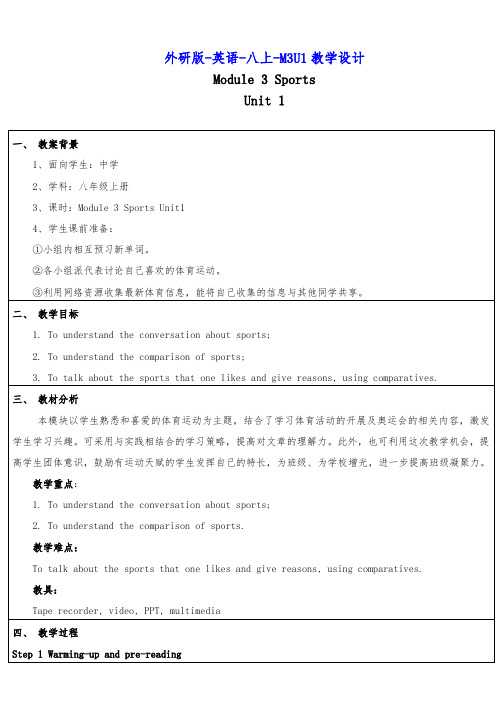
5. Going to the stadium was more difficult than staying at home. T
1. Use sporting pictures to help students to understand the adjectives.
2. Give them two pictures, and ask them to describe the pictures with comparatives.
2. S: They’re talking about sports.
设计意图:对课文的处理先通过教师介绍,使学生对内容初步感知,继而带着简单的问题听录音,既锻炼了听力,也为下面的学习打下基础。
Step 4 Read the dialogue and check the true sentences. Then find the difficulties in the text.
1. This week’s match is more exciting than last week’s. T
2. Tony played table tennis yesterday. F
3. For Tony, playing tennis is more enjoyable than watching matches on TV. T
2. Match and check.
3. Listen and number the sports as you hear them.
八年级英语上册 Module 3 Unit 1 Nothing is more enjoyable than playing tennis学案(新版)外研版
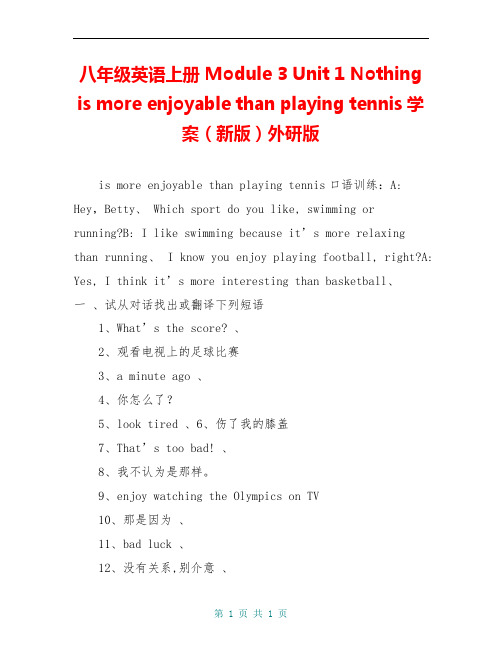
八年级英语上册 Module 3 Unit 1 Nothing is more enjoyable than playing tennis学案(新版)外研版is more enjoyable than playing tennis口语训练:A: Hey,Betty、 Which sport do you like, swimming orrunning?B: I like swimming because it’s more relaxingthan running、 I know you enjoy playing football, right?A: Yes, I think it’s more interesting than basketball、一、试从对话找出或翻译下列短语1、What’s the score? 、2、观看电视上的足球比赛3、a minute ago 、4、你怎么了?5、look tired 、6、伤了我的膝盖7、That’s too bad! 、8、我不认为是那样。
9、enjoy watching the Olympics on TV10、那是因为、11、bad luck 、12、没有关系,别介意、13、plenty of time 二、自读课文,并能翻译、背诵、默写下列重点句型。
1、Nothing is more enjoyable than playing tennis 、2、So this week’s match is already more exciting 、3、I’m not sure about that、4、 Never mind、There’s still plenty of time for them to score、4、写出下列形容词的汉语意思并写出他们各自的比较级。
Dangerous difficult expensive popular______________________interesting comfortable 小组合作探究:以上的形容词属于_________________ 音节形容词,它们有一个共同点:比较级都是由“___________ + ____________构成。
外研版英语八年级上册全册教案

Module 1 How to learn EnglishUnit 1 Let’s try to speak English as much as possible.主备人:李桂青审核人:张硕课时:2一、教学目标1. Function: Giving suggestions (English study)2. Structure: Giving advice: 1) We/You should… 2) Let’s try to…3) Why not…? 4) It’s a good idea to…5) How about…? 6) Why don’t we/you…?7) It’s better not to…3. Skills: 1) Listening and understanding familiar topics (English study).2) Talking about problems in English study and giving advice, conductingconversations in several turns.3) Reading and finding specific information about English study.4) Drafting a letter asking for advice about English study, revising through pair discussion..4. Around the world: English online5. Task: Writing your English study plan.二、重点及难点:Giving advice: 1) We/You should…2) Let’s try to…3) Why not…? 4) It’s a good idea to…5) How about…? 6) Why don’t we/you…? 7) It’s better not to…三、教学设计:Unit 1 Let’s try to speak English as much as possible.ⅠTeaching modelListening and speakingⅡTeaching methodPWP approachⅢTeaching aims1. To understand conversations involving advice on learning English.2. To get information about how to learn English from the conversation.3. To understand the way of giving advice.4. To practise giving advice on English learning.Ⅳ Teaching StepsStep 1 Warming up1.Elicit the topic: How to learn English well?2. Learn the new words and expressions.Step 2 Listening and vocabulary1. Read the instructions in Activity 1and check(√) the ones you understand.1) Work in pairs. Ask and answer the questions.2) Correct the spelling.3) Listen and check the words you hear.4) Practise saying the words.5) Match the words with the meaning.6) Complete the sentences with the words in the box.Ask the students to compare their answer with a partner.2. Listening1) Ask the students to read the word and expressions in Activity 2.dictionary grammar letter look up make a mistake meaning understand2) Read through the questions.1) Which word did Daming not understand?2) What mistake did Lingling make?3) How does Daming usually check the spelling of a word?4) Why is it difficult for Daming to check the spelling of cinema?3) Play the recording and ask the students to listen to the recording carefully.4) Listen again and answer the questions. Use the words and expressions from thebox.5) Play the recording again, then they can check their answer with a partner.6) Call back the answer from the whole class and check the answer.Step 3 Listen and read.1. Show some pictures, and ask the students to talk about good ways to learn English.2. Ask the students to read the conversation silently.3. Play the recording and ask the students to listen and read the conversation.4. Work on Activity 3 on page 3.5. Learn “Everyday English”Step 4 Language points1. Practise saying the words.practise用作动词,意为“练习”,后面可跟名词、代词或动词-ing形式作宾语。
外研版八年级英语上册Module 3 unit1 .教案
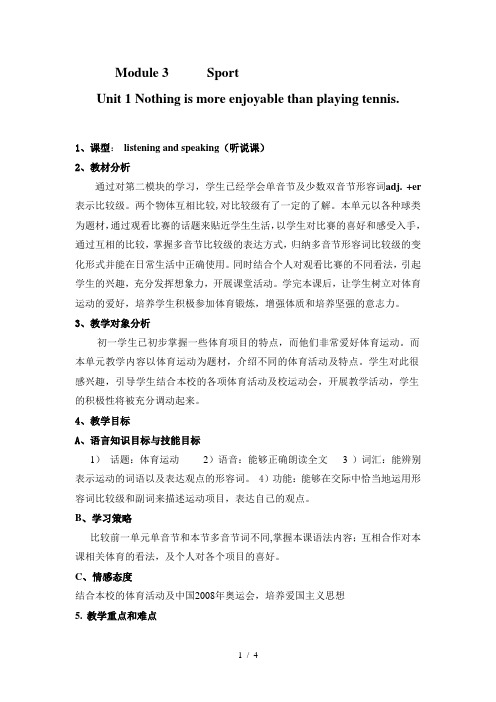
Module 3 SportUnit 1 Nothing is more enjoyable than playing tennis.1、课型:listening and speaking(听说课)2、教材分析通过对第二模块的学习,学生已经学会单音节及少数双音节形容词adj. +er 表示比较级。
两个物体互相比较,对比较级有了一定的了解。
本单元以各种球类为题材,通过观看比赛的话题来贴近学生生活,以学生对比赛的喜好和感受入手,通过互相的比较,掌握多音节比较级的表达方式,归纳多音节形容词比较级的变化形式并能在日常生活中正确使用。
同时结合个人对观看比赛的不同看法,引起学生的兴趣,充分发挥想象力,开展课堂活动。
学完本课后,让学生树立对体育运动的爱好,培养学生积极参加体育锻炼,增强体质和培养坚强的意志力。
3、教学对象分析初一学生已初步掌握一些体育项目的特点,而他们非常爱好体育运动。
而本单元教学内容以体育运动为题材,介绍不同的体育活动及特点。
学生对此很感兴趣,引导学生结合本校的各项体育活动及校运动会,开展教学活动,学生的积极性将被充分调动起来。
4、教学目标A、语言知识目标与技能目标1)话题:体育运动2)语音:能够正确朗读全文 3 )词汇:能辨别表示运动的词语以及表达观点的形容词。
4)功能:能够在交际中恰当地运用形容词比较级和副词来描述运动项目,表达自己的观点。
B、学习策略比较前一单元单音节和本节多音节词不同,掌握本课语法内容;互相合作对本课相关体育的看法,及个人对各个项目的喜好。
C、情感态度结合本校的体育活动及中国2008年奥运会,培养爱国主义思想5. 教学重点和难点(1)重点:掌握比较体育运动的基本词汇,能够准确读出并写出more , dangerous , gymnastics , skiing , popular , exciting , tiring , unpopular , boring , relax , relaxing , safe , be good at 等单词;(2)难点:学习comparative adjectives with more的用法,能够区分单音节和多音节单词,并且能正确使用他们的变法掌握形容词比较级more...than...的用法。
外研版英语(新标准)八年级上册Module 3 Sports Unit 1 教案
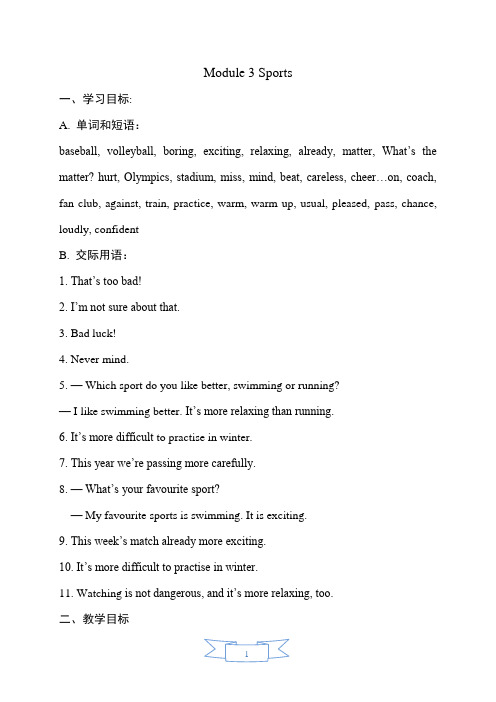
Module 3 Sports一、学习目标:A. 单词和短语:baseball, volleyball, boring, exciting, relaxing, already, matter, What’s the matter? hurt, Olympics, stadium, miss, mind, beat, careless, cheer…on, coach, fan club, against, train, practice, warm, warm up, usual, pleased, pass, chance, loudly, confidentB. 交际用语:1. That’s too bad!2. I’m not sure about that.3. Bad luck!4. Never mind.5. — Which sport do you like better, swimming or running?— I like swimming better. It’s more relaxing than running.6. It’s more difficult to practise in winter.7. This year we’re passing more carefully.8. —What’s your favourite sport?— My favourite sports is swimming. It is exciting.9. This week’s match already more exciting.10. It’s more difficult to practise in winter.11. Watching is not dangerous, and it’s more relaxing, too.二、教学目标1. Function: Describing and comparing sports.2. Structure: Comparative adjectives (more); adverbs and comparative adverbs (-er, more); irregular comparatives.3. Skills: 1) Listening and understanding familiar topics (sports).2) Comparing sports, linking words correctly.3) Reading and understanding behaviours of characters; guessing themeaning of new words from the context.4) Writing about your school basketball team.4. Around the world: The marathon race5. Task: Making a sports poster.三、重点及难点:Comparative adjectives (more); adverbs and comparative adverbs (-er, more); irregular comparatives.四、教学设计:Unit 1 Nothing is more enjoyable than playing tennis.ⅠTeaching modelListening and speakingⅡTeaching methodPWP approachⅢTeaching aims1. To understand conversations about sports, process information of comparisonconcerning sports;2. To talk about the sports one likes using comparative formsⅣTeaching Objectives1. Key vocabulary: baseball, volleyball, boring, exciting, relaxing, already,matter, What’s the matter? hurt, Olympics, stadium, miss,mind2. Key structures: Comparative adjectives(more)3. Key sentences:1) —… What’s the score?— Spain scored a minute ago.2) So this week’s match is already more exciting.3)—What’s the matter with you, Tony?— You look exciting.3) But you enjoyed watching the Olympic on TV, right?4) And staying at home was easier than going to the stadium.ⅤTeaching aidsTape recorder, OHP, videoⅥTeaching StepsStep 1 Warming up1. Show some pictures of school things. What's your favourite sport?2. Talk about sports.3. Introduce the new words.4. Learn the new words.5. Read the new words.Step 2 Look, listen and say.1. Ask the students to read the words in Activity 1.2. Play the recording and ask the students to listen to the recording carefully.3. Listen and number the sports as you hear them.4. Now match the words with the pictures.5. Ask the students to check their answer with a partner.6. Call back the answer from the whole class and check the answer.7. Ask the students to read the words in Activity 2.8. Look at the sports in Activity 1 and talk about them.1) Last week the football match on TV was so boring because no one scored at all.2) Playing baseball is very dangerous.3) Watching playing tennis is safer than playing it.4) Staying at home is easier than going to the stadium.5) Playing table tennis is very popular in China.6) This week’s NBA match is already more exciting.7) Swimming isn’t safe, it’s dangerous.8) Running isn’t expensive, it’s very cheap.Step 3 Listen and read.1. Show some pictures, and ask the students to talk about them.2. Ask the students to read the conversation silently.3. Play the recording and ask the students to listen and read the conversation.4. Read the conversation.5. Act it out.6. Learn “Everyday English”That’s too bad!I’m not sure about that.Bad luck!Never mind.Step 4 Check ( √ ) the true sentences.1. Ask the students to read the conversation again.2. Now check ( √ ) the true sentences.1) This week’s match is more exciting than last week’s.2) Tony played table tennis yesterday.3) For Tony playing tennis is more exciting than watching matches on TV.4) Watching the Olympics on TV was more expensive than buying tickets for the games.5) Going to the stadium was more difficult than staying at home.3. Ask the students to check with a partner.4. Check the answers:Keys:1. √ 3. √ 5. √Step 5 Complete the sentences.1. Ask the students to read the words in the box in Activity 4.2. Read through the sentences.1) Why didn’t Tony score? What’s the ___________ with him?2) You lost the matter? Never __________. Maybe you’ll win next time.3) I’m not good at tennis. I always ___________ the ball.4) The match began ten minutes ago and Spain is ____________ winning.5) The 2008 __________ were in Beijing.6) Watching football at home is easier than going to the __________.7) Tennis is a little dangerous because you may _________ you knee.3. Complete the sentences with the correct words from the box.4. Ask the students to check with a partner.5. Check the answers:Keys:1. matter2. mind3. miss4. already5. Olympics6. stadium7. hurt Step 6 Complete the passage.1. Ask the students to the words in the box in Activity 1.2. Ask the students to read through the passage in Activity 5.My favourite sports is (1) ____________. And I enjoy watching (2) ____________. I’m quite good at (3) ____________. I don’t like playing (4) ___________. And I’m not very good at (5) _____________.3. Use the words in Activity 1 to complete the passage about yourself.4. Check with a partner.5. Read the passage by yourself.Step 7 Listen and repeat.1. Play the recording once without stopping.2. Play the recording again and ask the whole class to repeat.1) Spain scored a minute ago.2) Last week the match on TV was so boring because no one scored at all.3) Oh, look at that.3. Ask the students to listen and mark the intonation.4. Now listen again and repeat.Step 8 Work in pairs.1. Talk about the sports you like.2. Read through the example with the class.— Hey, Bruce. Which sport do you like better, swimming or running?— I like swimming better. It’s more relaxing than running.3. Work in pairs.Step 9 Language points1. —… What’s the score? 比分是多少?— Spain scored a minute ago. 西班牙(队)一分钟前得分了。
外研版英语八年级上Module3Unit1教案
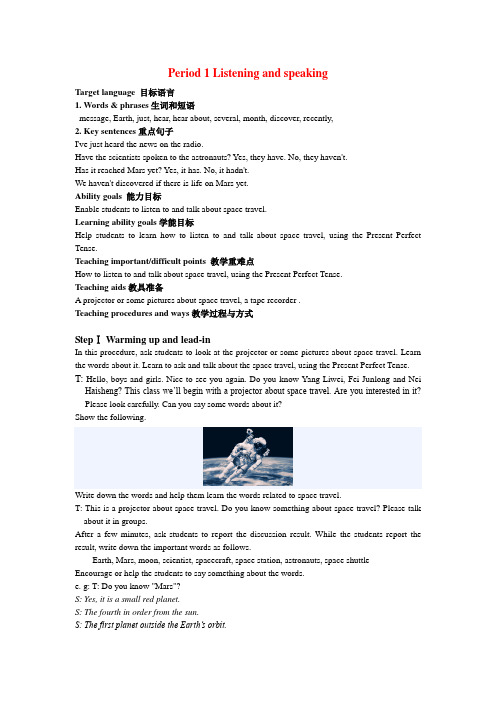
Period 1 Listening and speakingTarget language 目标语言1. Words & phrases生词和短语message, Earth, just, hear, hear about, several, month, discover, recently,2. Key sentences重点句子I've just heard the news on the radio.Have the scientists spoken to the astronauts? Yes, they have. No, they haven't.Has it reached Mars yet? Yes, it has. No, it hadn't.We haven't discovered if there is life on Mars yet.Ability goals 能力目标Enable students to listen to and talk about space travel.Learning ability goals学能目标Help students to learn how to listen to and talk about space travel, using the Present Perfect Tense.Teaching important/difficult points 教学重难点How to listen to and talk about space travel, using the Present Perfect Tense.Teaching aids教具准备A projector or some pictures about space travel, a tape recorder .Teaching procedures and ways教学过程与方式StepⅠ Warming up and lead-inIn this procedure, ask students to look at the projector or some pictures about space travel. Learn the words about it. Learn to ask and talk about the space travel, using the Present Perfect Tense. T: Hello, boys and girls. Nice to see you again. Do you know Yang Liwei, Fei Junlong and Nei Haisheng? This class we’ll begin with a projector about space travel. Are you interested in it?Please look carefully. Can you say some words about it?Show the following.Write down the words and help them learn the words related to space travel.T: This is a projector about space travel. Do you know something about space travel? Please talk about it in groups.After a few minutes, ask students to report the discussion result. While the students report the result, write down the important words as follows.Earth, Mars, moon, scientist, spacecraft, space station, astronauts, space shuttle Encourage or help the students to say something about the words.e. g: T: Do you know "Mars"?S: Yes, it is a small red planet.S: The fourth in order from the sun.S: The first planet outside the Earth’s orbit.Go on with the others in the same way.Step II Listening and readingT: Next let's listen to a passage. In this passage Daming and Tony are talking about space travel. Please listen carefully and answer two questions.Show the following.1. Has the spacecraft read Mars yet?2. Have we discovered if there is life on Mars yet?Play the tape for the first time. Ask students to answer.Sample answers:1. Yes, it has.2. No, we haven't.T: Now listen again. This time please underline the new words of this passage.After listening, ask students to discuss in groups and try to explain them in English.Sample words:Mars: a planet in solar systemmission: taskdiscover: to find…T: Please listen to the recording for the last time and answer the questions in 4.Play the recording. Then check the answers.After this, ask students to repeat after the recording. Then read in pairs.Then ask students to finish activities 5 and 6. Check the answers.Sample answers to activity 6:Something you’ve borrowed this week:I’ve borrowed some books about space travel this week.I’ve borrowed a map of the wo rld this week.Something you’ve done recently:I’ve finish reading a novel about an astronaut recently.I’ve received three letters from my friends recently.A model of something you have seen:I’ve seen a model of Zhang Heng’s seismograph.I’ve seen a model of spacecraft in Science Museum.Something scientists have discovered:American scientists have discovered that some plants are able to correct mistakes in their own genetic (遗传的) material.Then show the following and tell students something about the present perfect tense.1. I've just heard the news on the radio about the space mission to Mars.2. I haven't heard about this yet.3. Has it reached Mars yet?T: In these sentences we can find the structure: have / has +pp. Can you find more sentences like these in the passage? We use the Present Perfect to say that an action happened at an unspecified time before now. The exact time is not important.Show the following.EXAMPLES:I have seen that movie twenty times.I think I have met him once before.There have been many earthquakes in California.Has there ever been a war in the United States?People have traveled to the moon.Step III Pronunciation and speakingPlay the recording. Ask students to underline the words the speaker stresses. Then check the answers. Then ask students to read after the recording and repeat the sentences.SpeakingT: We have known much about space travel in this class. Can you write down things we've done and the things we haven't done yet about space travel?Check the answers with the class.Sample answers:We've sent astronauts to the Moon.We haven't sent astronauts to Mars.…Then ask students to exchange the things they wrote and check who has the longest list.Step IV Homework1.Ask students to learn the new words and expressions in this unit.2.Ask students to write a short passage to introduce space travel.。
新外研版八年级英语上册Module 3 Unit1 Nothing is more enjoyable than playing tennis 教案

Module 3 Unit1 Nothing is more enjoyable than playing tennis 教案一、教学内容:Unit1 Nothing is more enjoyable than playing tennis.二、课型:Listening and speaking三、教学目标:1、能够正确使用下列单词和词组:baseball, volleyball, boring, exciting, relaxing, score,already, matter, hurt, enjoyable, Olympics, stadium, miss, mind, plenty, plenty of.2、能正确使用下列句型:What’s the score?What’s the matter with you?That’s too bad!I’m not sure about that.Bad luck!Never mind!That’s because...Staying at home was easier than going to the stadium.3、能够听懂谈论运动的谈话并回答相关的简单问题。
4、能用形容词及其比较级描述球类运动。
5、通过对本单元的学习,了解各项球类运动,增加对体育锻炼的兴趣。
教学重难点:能够熟练运用形容词、副词的比较级形式比较不同的体育项目。
四、教学准备:课堂整体运用任务型教学模式,培养学生独立自主的学习能力。
本课指导学生通过听说获取信息,培养学生的听说技能。
在教学过程中,采用多媒体手段辅助教学,利用各种图片、实物和习题任务贯穿整个教学过程。
因此,本节课需准备:PPT课件、挂图、录音机、实物、课堂练习表格、奖品五、教学过程:七、板书设计:Module3. SportsUnit1. Nothing is more enjoyable than playing tennis.Football is more exciting than basketball.Playing table tennis is easier than playing volleyball.达标训练题一、用所给词的适当形式填空:1. Playing football is ___________ (exciting) than watching it.2. Tennis is ____________ (difficult) than basketball.3.Table tennis is __________( popular) than football in China.4. I think swimming is _________ (relaxing) than running.5. Tennis is __________ ( boring) than table tennis.二、选择正确的答案:( ) 1. - ________? You look tired.A.What’s the wrongB.What’s the matter with youC. What’s matter with youD. What’s the matter of you( ) 2. Running is ________ than table tennis because you can do it everywhere.A. easyB. difficultC. easierD. more difficult( ) 3. -I failed the exam! - _________.Study hard and you will pass it next time.A. That’s too bad!B.I’m not sure about thatC. Bad luck!D. Never mind!( )4. —What’s the time?.—It’s 8 .Don’t worry.We still have ____________time.A. plenty ofB. manyC. lot ofD. little( )5. Playing football is _____than _______it at home.A.more exciting ;watchB. more dangerous; watchingC. excitinger;watchingD. Dangerouser;watching。
八年级英语上册 Module 3 Unit1教学设计 外研版
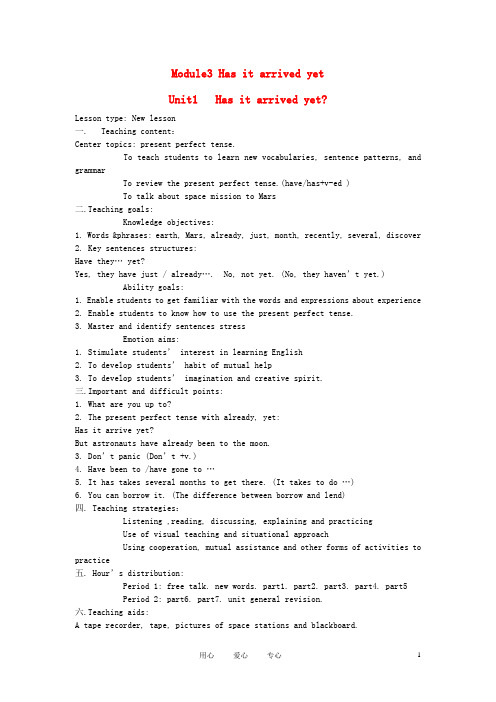
Module3 Has it arrived yetUnit1 Has it arrived yet?Lesson type: New lesson一. Teaching content:Center topics: present perfect tense.To teach students to learn new vocabularies, sentence patterns, and grammarTo review the present perfect tense.(have/has+v-ed )To talk about space mission to Mars二.Teaching goals:Knowledge objectives:1. Words &phrases: earth, Mars, already, just, month, recently, several, discover2. Key sentences structures:Have they… yet?Yes, they have j ust / already…. No, not yet. (No, they haven’t yet.) Ability goals:1. Enable students to get familiar with the words and expressions about experience2. Enable students to know how to use the present perfect tense.3. Master and identify sentences stressEmotion aims:1. Stimulate students’ interest in learning English2. To develop students’ habit of mutual help3. To develop students’ imagination and creative spirit.三.Important and difficult points:1. What are you up to?2. The present perfect tense with already, yet:Has it arrive yet?But astronauts have already been to the moon.3. Don’t panic (Don’t +v.)4. Have been to /have gone to …5. It has takes several months to get there. (It takes to do …)6. You can borrow it. (The difference between borrow and lend)四. Teaching strategies:Listening ,reading, discussing, explaining and practicingUse of visual teaching and situational approachUsing cooperation, mutual assistance and other forms of activities to practice五. Hour’s distribution:Period 1: free talk. new words. part1. part2. part3. part4. part5Period 2: part6. part7. unit general revision.六.Teaching aids:A tape recorder, tape, pictures of space stations and blackboard.七.Teaching procedures:Period 1Teaching aims:1. Revision the present perfect tense.2. To learn new vocabularies.3. Practice listening and speaking.4. Learning sentences.What are you up to?Has it arrive yet?But astronauts have already been to the moon. e.g.Step 1 Revision the present perfect tense1. Greetings.- Have you had your breakfast / lunch?- Have you cleaned your classroom?- Has your father gone to work today?…Step 2 Pre-task1. Read the new words2. Explain the new words and phrasesStep3 Listening (Activities 1 & 2)1. Tell students to listen to a piece of news about the travel mission to Mars and find the answer to the question “Have they discovered life on Mars yet?” and finish activity 1.Listen and number the words as you hear them.2. Listen again and finish activity 2.Check the true sentences.Step 4 Listening and reading (Activities 3, 4, 5)1. Tell students Deming’s friend Tony has made a model of a space station, and now they are talking about the model. Ask students to listen and read the dialogues, and then try to answer three questions:①. Has the spacecraft to Mars arrived yet?②. Have many astronauts been to the moon recently?③. How do the astronauts go back to the earth from the space station?2. Ask students to read the dialogue again and finish activities 4 and 5.3. Students read after the tape and then act out the dialogue.4. Listion to the tape and follow it again.Period 2Teaching aims:1. Learn to use the present perfect tense.2. Pronunciation and speaking correctly.3. Cooperation, mutual assistance and writingStep1 Reviewing:Review the content last lesson learned.Step 2Tasks (Activity 6)Show students some pictures of space stations, and introduce the basic structures of a space station.Step3Ask students to discuss in groups of four to find the differences between the life on earth and the life at a space station. They may use “We can… but we can’t….”Step4 Pronunciation and speaking. (Activity 7)Get students read after the tape recorder to pronounce properly. And then ask them to underline the stresses at activity 7.Step5Listen to the tape again, explain and check it.Step6 Writing competitions (Activities 8 & 9)Show students the photos of Chinese famous astronauts Yang Liwei, Fei Junlong and Nie Haishen. Ask students to talk in groups of four about what we Chinese have already done about the space travel and what we haven’t done yet. First, students work by themselves in three minutes, and then share his / her ideas with the workmates in three minutes; finally the groups show their ideas before the whole class. The one who has the longest list will win the competition.Step7 Conclude and review (Teachers lead students to conclude and review):1. Read the new words again and again2. Help students have a revision of what they have learned today, especially the present perfect tense3. Read the conversation again.Step8 Homework1. Read text, copy and memory the vocabularies and grammar of this lesson.2. Search the Internet, and try to find some materials about the nine planets of the sun.八.Blackboard design:Topic: Has it arrived yet?Main content: present perfect tense.Important and difficult points:Has it arrive yet?But astronauts have already been to the moon.Have been to /have gone to ………。
外研版八年级英语上册 Module 3 Sports Unit 1 Nothing is more enjoyable than playing tennis教案
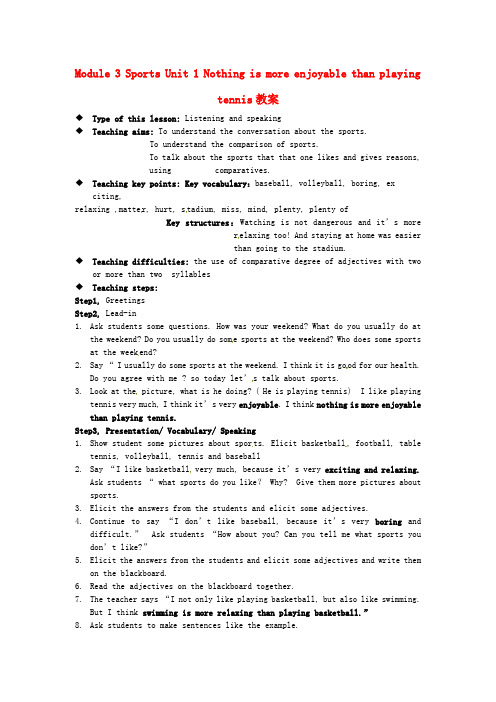
Module 3 Sports Unit 1 Nothing is more enjoyable than playingtennis教案◆Type of this lesson: Listening and speaking◆Teaching aims: To understand the conversation about the sports.To understand the comparison of sports.To talk about the sports that that one likes and gives reasons,using comparatives.◆Teaching key points: Key vocabulary:baseball, volleyball, boring, exciting,relaxing ,matte r, hurt, s tadium, miss, mind, plenty, plenty ofKey structures:Watching is not dangerous and it’s morer elaxing too! And staying at home was easierthan going to the stadium.◆Teaching difficulties: the use of comparative degree of adjectives with twoor more than two syllables◆Teaching steps:Step1, GreetingsStep2, Lead-in1.Ask students some questions. How was your weekend? What do you usually do atthe weekend? Do you usually do som e sports at the weekend? Who does some sportsat the week end?2.Say “I usually do some sports at the weekend. I think it is go od for our health.Do you agree with me ? so today let’s talk about sports.3.Look at the picture, what is he doing? ( He is playing tennis) I li ke playingtennis very much, I think it’s very enjoyable. I think nothing is more enjoyablethan playing tennis.Step3, Presentation/ Vocabulary/ Speaking1.Show student some pictures about spor ts. Elicit basketball, football, tabletennis, volleyball, tennis and baseball2.Say “I like basketball very much, because it’s very exciting and relaxing.Ask students “ what sports do you like? Why? Give them more pictures aboutsports.3.Elicit the answers from the students and elicit some adjectives.4.Continue to say “I don’t like baseball, because it’s very boring anddifficult.” Ask students “How about you? Can you tell me what sports youdon’t like?”5.Elicit the answers from the students and elicit some adjectives and write themon the blackboard.6.Read the adjectives on the blackboard together.7.The teacher says “I not only like playing basketball, but also like swimming.But I think swimming is more relaxing than playing basketball.”8.Ask students to make sentences like the example.9.Students say their sentences one by one.10.Work in pa irs and ask and answer.Step4, Listening1, Read the words in the box in Activity 1 chorally.2, Match the word with the pictures.3. Say “Just now we talked about our favourite sports , Daming and Betty also like sports very much. Let’s listen to the tape and find out what sports they like. When you are listen, you should number the words as you hear them..4. Play the recording and listen for the first time.5. Listen again and ask the students to check their answers.6. Elicit the answers from th e students.7. Listen and check the answer together.Step5, Listening and reading1.Ask students to read and listen to Activity 3. And answer the questions.2.Ask a student “What do you do and say when you meet your teacher?” and writeit on the blackboard.3.Write the answer on the blackboard.4.Do Activity5. Work in pairs and. Talk about what so you do and say when y ou meetdifferent people.5.Elicit the answers from students.。
外研版英语八年级上册Module 3 Unit 1《Nothing is more eciting

外研版英语八年级上册Module 3 Unit 1《Nothing is more eciting than playingtennis》教学设计一. 教材分析外研版英语八年级上册Module 3 Unit 1的主题是“Nothing is more exciting than playing tennis”,通过介绍网球运动来培养学生的英语应用能力。
本节课主要学习了与网球相关的词汇和短语,如play tennis, serve, volley, backhand, forehand等,以及一般现在时态的句子。
同时,本节课还涉及到形容词比较级和最高级的用法,以及如何用英语表达自己的喜好和兴趣。
二. 学情分析八年级的学生已经掌握了基本的英语语法和词汇,具备一定的听说读写能力。
他们对网球运动有一定的了解,但可能对一些专业术语不太熟悉。
因此,在教学过程中,教师需要帮助学生掌握网球相关词汇,并能够运用一般现在时态表达自己的喜好。
三. 教学目标1.知识目标:–学生能够掌握与网球相关的词汇和短语;–学生能够运用一般现在时态表达自己的喜好和兴趣;–学生能够正确使用形容词比较级和最高级。
2.能力目标:–学生能够在课堂上用英语进行简单的交流和讨论;–学生能够独立完成听力、阅读和写作任务。
3.情感目标:–学生能够激发对网球运动的兴趣,培养积极参与体育活动的意识;–学生能够通过英语学习,增强自信心和团队合作精神。
四. 教学重难点•与网球相关的词汇和短语;•一般现在时态的句子结构;•形容词比较级和最高级的用法。
•形容词比较级和最高级的句型结构;•如何运用英语表达自己的喜好和兴趣。
五. 教学方法1.任务型教学法:通过设计各种任务,让学生在实际语境中运用英语,提高学生的语言运用能力;2.交际法:引导学生进行小组讨论和互动,培养学生的口头表达能力;3.情境教学法:创设情境,让学生在具体的情境中学习英语,提高学生的学习兴趣。
六. 教学准备1.教学课件:制作多媒体课件,包括网球相关的图片、视频和音频材料;2.教学卡片:准备与网球相关的词汇和短语的卡片;3.练习册:准备相关的练习题,用于巩固所学知识。
外研版八年级英语上Module 1 Unit 3教案与反思精品

Module 1 How to learn English投我以桃,报之以李。
《诗经·大雅·抑》翰辰学校李道友组长一、教学内容:Unit 3 Language in use二、课型:Revision and application三、教学目标:1、能正确运用本模块的词汇:club, together, start, hear等。
2、掌握如果提出建议的句型,在同学之间进行真实的交际。
3、能够根据同学的学习情况,就其学习中的问题或困难提出适当的建议;根据别人的建议制定自己的学习计划。
4、提高学习英语兴趣,树立信心,培养其积极主动参与各种语言实践活动的学习态度。
四、教学重难点:运用所学的知识就同学学习中的问题或困难提出适当的建议;根据别人的建议制定自己的学习计划。
五、教学准备:本节课型为Revision and application,根据新课标的要求,结合教材和学生特点,主要采用任务型互动式进行教学,结合情景法、交际法、听说法、归纳法等教学方法实施课堂活动,开启学生思维,通过一系列有条理的教学活动,引导学生自主探究学习和与他人互动合作学习,让学生体验愉快学习。
本节课所需教具及资料:幻灯、图片、调查表等。
六、教学过程:Blackboard design:达标训练题一、单项选择(7分)。
1. Speaking English loudly is good _____ improving my English.A. atB. forC. inD. of.*cnjy*co2. ---Don 't forget __________ your homework ,John.---OK . I ' ll do it right now . .A. doingB. to doC. didD. do.3. --- Can I help you, sir ?--- I’d like to have 100 ______ . I want my students to draw pictures.A. piece of paper.B. pieces of papers.C. pieces of paperD. piece of papers4. We should ______our friends when we meet our friends on the street.21cnjyA. say hello toB. say goodbye toC. saying hello to.D. speak hello to.5. He always practises __________ English so as to improve his oral English .----Of course . You 'd better get much listening practice.A. speakB. speakingC. to speak. *cnjy*coD. speaks6. ---- Let’s discuss the play ,shall we ? Would you like ?---- Not now. I ________ to an interview.A. go.B. wentC. was goingD. am going.7. Your sweater looks smart. Where ________you ?A. do, get..B. did,get..C.will, get.D.have,got.二、阅读理解。
外研版八年级英语上册Module 3 Unit 1 Nothing is more enjoyabl

外研版八年级英语上册Module 3 Unit 1Nothing is more enjoyable than playingtennis.教案外研版新标准英语八年级上册Module 3 Sports Unit 1 Nothing is more enjoyable than playing tennis.教学设计一、教材分析:本课是外研版新标准英语八年级上册Module3 Sports Unit1 Nothing is moreenjoyable than playing tennis,主要围绕“sports”这一主题展开各种教学活动,并以这一主题引出多音节和部分双音节形容词的比较级形式:more+形容词原形。
在实际场景中熟练运用这一句型结构比较两种事物的语言功能。
本课旨在创造一个轻松、愉快的学习和交流环境,通过有限的课堂实践活动,充分调动学生学习的积极性,提升学生综合运用知识的能力。
二、学情分析:在上一模块的学习过程中,学生已经掌握单音节形容词和少数双音节形容词的比较级形式、变化规则以及含有比较级的常用句型。
并会运用这一知识比较两种事物或人物。
但他们并不知如何用形容词(三音节词及部分双音节词)的比较级形式做出合适的比较,表达个人观点。
且八年级学生具有很强的求知欲和表现欲。
根据他们现有的知识储备和心理特点,授课过程中,教师应采用多种方式,组织丰富、有趣的教学活动,吸引学生的注意,激发学生参与的热情,实现活泼而又有实效的课堂。
三、教学目标:(知识、技能、情感态度价值观)(一)语言知识目标:1. 功能:能向同学介绍自己喜欢的体育项目。
2. 语法:形容词(多音节和部分双音节)的规则比较级形式。
3. 词汇:能听说读写下列单词和短语:baseball, volleyball, boring, exciting, relaxing, matte, hurt, stadium, miss, mind, plenty, plenty of。
外研版八年级英语上册同步教案module 3 unit 1 nothing is more enjoyable than playing tennis

Module 3 Sports Unit 1 Nothing is more enjoyable than playingtennis.提纲挈领词汇扫描1. boring adj. 烦人的;无聊的【点拨】boring意为“烦人的;无聊的”,通常指某物或某事给人的感觉,常用来修饰事物;bored意为“厌烦的”,通常指某人对某事或某物感到厌烦,常用来修饰人。
如:①The football match is very boring.足球比赛非常无聊。
②She is bored with her work.她对自己的工作感到厌烦。
以-ing结尾的形容词,如:interesting有趣的;surprising令人惊奇的;moving令人感动的;touching 触动人心的;satisfying令人满意的;amazing令人惊讶的;exciting令人兴奋的;boring令人讨厌的;fri-ghtening令人害怕的;tiring 令人厌倦的。
以-ed结尾的形容词,如:interested 感兴趣的;surprised感到好奇的;frightened害怕的;moved 感动的;touched感动的;satisfied感到满意的;bored感到厌烦的;excited感到激动的;amazed感到惊讶的;tired感到厌烦的。
2. hurt v. 伤害;(使)受伤【点拨】hurt用作及物动词时,意为“伤害;(使)受伤”。
常指精神上、感情上和肉体上的伤害,含有“强烈的疼痛”之意。
如:①The little boy fell off the tree and hurt himself seriously.这个男孩从树上掉下来,伤得很重。
②That’ll hurt her feelings.那将会伤害她的感情。
【延伸】hurt用作不及物动词时,意为“疼痛”。
如:Does your right leg still hurt badly?你的右腿仍然疼得厉害吗?3. miss v. 未击中;未达到【点拨】miss既可用作不及物动词,也可用作及物动词,意为“未击中;未达到;未赶上;未抓住;错过”。
- 1、下载文档前请自行甄别文档内容的完整性,平台不提供额外的编辑、内容补充、找答案等附加服务。
- 2、"仅部分预览"的文档,不可在线预览部分如存在完整性等问题,可反馈申请退款(可完整预览的文档不适用该条件!)。
- 3、如文档侵犯您的权益,请联系客服反馈,我们会尽快为您处理(人工客服工作时间:9:00-18:30)。
教学设计一:设计理念:本单元的教学理念是“在玩中学,在玩中用”。
多媒体辅助教学贯穿教学过程,增加了教学的直观性和趣味性,激发了学生参与的欲望,提高了教学效果。
二:教材分析:新目标英语八年级上册Module3 Unit 1 Nothing is more enjoyable than playing tennis. 学习内容主要体现在以下几点:①学习有关球类及相关的单词。
baseball, volleyball, boring, exciting, relaxing, already, matter, What’s the matter? hurt, Olympics, stadium, miss, mind,②学习比较级的重要句型1) —… What’s the score?—Spain scored a minute ago.2) So this week’s match is already more exciting.3)—What’s the matter with you, Tony?—You look exciting.3) But you enjoyed watching the Olympic on TV, right?4) And staying at home was easier than going to the stadium.③掌握语法:the comparative degrees of adjectives三:Students analysis:①利用多媒体课件上课,学生视觉感受明显,表现出极大兴趣,学习效果很明显。
②学生上个模块学习单音节形容词比较级,这节课主要学习多音节形容词比较级,这两者是学生容易弄混的地方,常常把more和er 同时加。
通过对本节课的学习,让学生掌握用正确的语言结构表达比较级。
四:Teaching designs:①比较级是本单元的话题,源自生活,我充分利用学生已有的知识和生活经验,引导学生在运用语言中学习语言,然后再学习新的语言知识后,创造性地运用知识,反复操练和巩固应用是为了调动学生的积极性。
②词汇教学—--利用多媒体展示图片的方式教学。
③口语教学—--采用小组内问答的方式进行操练。
④听力教学—--采用图文配对和判断的方式。
⑤语法教学—操练-总结-操练的方式。
五:Teaching aims:培养学生听说能力和运用语言进行交际的能力。
六:Important and difficult pointsComparative adjectives (more); adverbs and comparative adverbs (-er, more);irregular comparatives.七:Teaching designs:Unit 1 Nothing is more enjoyable than playing tennis.ⅠTeaching model :Listening and speakingⅡTeaching method:PWP approachⅢTeaching aims1. To understand conversations about sports, process information ofcomparison concerning sports;2. To talk about the sports one likes using comparative formsⅣTeaching Objectives1. Key vocabulary: baseball, volleyball, boring, exciting, relaxing, already,matter, What’s the matter? hurt, Olympics, stadium, miss, mind2. Key structures: Comparative adjectives(more)3. Key sentences:1) — … What’s the score? —Spain scored a minute ago.2) So this week’s match is already more exciting.3)— What’s the matter with you, Tony? —You look exciting.3) But you enjoyed watching the Olympic on TV, right?4) And staying at home was easier than going to the stadium.ⅤTeaching aids:OHP, videoⅥTeaching StepsStep 1 Warming up1. Show some pictures of school things. What's your favourite sport?2. Talk about sports.3. Introduce the new words.4. Learn the new words.5. Read the new words.Step 2 Look, listen and say.1. Ask the students to read the words in Activity 1.2. Play the recording and ask the students to listen to the recording carefully.3. Listen and number the sports as you hear them.4. Now match the words with the pictures.5. Ask the students to check their answer with a partner.6. Call back the answer from the whole class and check the answer.7. Ask the students to read the words in Activity 2.boring dangerous difficult easy exciting expensive popular relaxing safe8. Look at the sports in Activity 1 and talk about them.1) Last week the football match on TV was so boring because no one scored at all.2) Playing baseball is very dangerous.3) Watching playing tennis is safer than playing it.4) Staying at home is easier than going to the stadium.5) Playing table tennis is very popular in China.6) This week’s NBA match is already more exciting.7) Swimming isn’t safe, it’s dangerous.8) Running isn’t expensive, it’s very cheap.Step 3 Listen and read.1. Show some pictures, and ask the students to talk about them.2. Ask the students to read the conversation silently.3. Play the recording and ask the students to listen and read the conversation.4. Read the conversation.5. Act it out.6. Learn “Everyday English”That’s too bad!I’m not sure about that.Bad luck!Never mind.Step 4 Check ( √) the true sentences.1. Ask the students to read the conversation again.2. Now check ( √) the true sentences.3. Ask the students to check with a partner.4. Check the answers:Step 5 Complete the sentences.1. Ask the students to read the words in the box in Activity 4.already hurt matter mind miss Olympics stadium2. Read through the sentences.1) Why didn’t Tony score? What’s the ___________ with him?2) You lost the matter? Never __________. Maybe you’ll win next time.3) I’m not good at tennis. I always ___________ the ball.4) The match began ten minutes ago and Spain is ____________ winning.5) The 2008 __________ were in Beijing.6) Watching football at home is easier than going to the __________.7) Tennis is a little dangerous because you may _________ you knee.3. Complete the sentences with the correct words from the box.4. Ask the students to check with a partner.5. Check the answers:Step 6 Complete the passage.1. Ask the students to the words in the box in Activity 1.2. Ask the students to read through the passage in Activity 5.3. Use the words in Activity 1 to complete the passage about yourself.4. Check with a partner.5. Read the passage by yourself.Step 7 Listen and repeat.1. Play the recording once without stopping.2. Play the recording again and ask the whole class to repeat.3. Ask the students to listen and mark the intonation.4. Now listen again and repeat.Step 8 Work in pairs.1. Talk about the sports you like.2. Read through the example with the class.3. Work in pairs.Step 9 Language points1. —…What’s the score? 比分是多少?—Spain scored a minute ago. 西班牙(队)一分钟前得分了。
